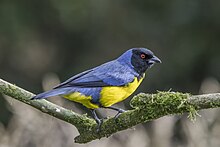Hooded mountain tanager
| Hooded mountain tanager | |
|---|---|

| |
| Buthraupis montana cucullata, Colombia | |
| Scientific classification | |
| Domain: | Eukaryota |
| Kingdom: | Animalia |
| Phylum: | Chordata |
| Class: | Aves |
| Order: | Passeriformes |
| Family: | Thraupidae |
| Genus: | Buthraupis Cabanis, 1851 |
| Species: | B. montana |
| Binomial name | |
| Buthraupis montana (d'Orbigny & Lafresnaye, 1837) | |

| |
| Hooded mountain tanager range map | |

The hooded mountain tanager (Buthraupis montana) is a species of bird in the tanager family Thraupidae. It is the only member of the genus Buthraupis. This yellow, blue and black tanager is found in forest, woodland and shrub in the Andean highlands of Bolivia, Colombia, Ecuador, Peru, and Venezuela. At 23 centimetres (9.1 in) and 85 grams (3.0 oz), it is one of the largest tanagers (second in weight only to the white-capped tanager).
Taxonomy
The hooded mountain tanager was formally described in 1837 by the French naturalists Alcide d'Orbigny and Frédéric de Lafresnaye from a specimen collected in the Bolivian Yungas. They coined the binomial name Aglaia montana.[2][3] It is now the only species placed in the genus Buthraupis that was introduced in 1851 by the German ornithologist Jean Cabanis.[4][5] The genus name combines the Ancient Greek bou- meaning "huge" and thraupis an unknown small bird but used by ornithologists to signify a tanager. The specific name is from the Latin montanus meaning "of the mountains".[6]
Six subspecies are recognised:[5]
- Buthraupis montana venezuelana Aveledo & Perez, 1989 – northwest Venezuela
- Buthraupis montana gigas (Bonaparte, 1851) – north Colombia
- Buthraupis montana cucullata (Jardine & Selby, 1842) – west, central Colombia to Ecuador
- Buthraupis montana cyanonota Berlepsch & Stolzmann, 1896 – north, central Peru
- Buthraupis montana saturata Berlepsch & Stolzmann, 1906 – southeast Peru
- Buthraupis montana montana (d'Orbigny & Lafresnaye, 1837) – west Bolivia
References
- ^ BirdLife International (2016). "Buthraupis montana". IUCN Red List of Threatened Species. 2016: e.T22722601A94774641. doi:10.2305/IUCN.UK.2016-3.RLTS.T22722601A94774641.en. Retrieved 11 November 2021.
- ^ d'Orbigny, Alcide; Lafresnaye, Frédéric de (1837). "Synopsis avium". Magasin de Zoologie (in Latin). 7 (2): 1–88 [32].
- ^ Paynter, Raymond A. Jr, ed. (1970). Check-List of Birds of the World. Vol. 13. Cambridge, Massachusetts: Museum of Comparative Zoology. p. 329.
- ^ Cabanis, Jean (1850–1851). Museum Heineanum : Verzeichniss der ornithologischen Sammlung des Oberamtmann Ferdinand Heine, auf Gut St. Burchard vor Halberstadt (in German and Latin). Vol. 1. Halberstadt: R. Frantz. p. 29.
- ^ a b Gill, Frank; Donsker, David; Rasmussen, Pamela, eds. (July 2020). "Tanagers and allies". IOC World Bird List Version 10.2. International Ornithologists' Union. Retrieved 3 November 2020.
- ^ Jobling, James A. (2010). The Helm Dictionary of Scientific Bird Names. London: Christopher Helm. pp. 81, 259. ISBN 978-1-4081-2501-4.

